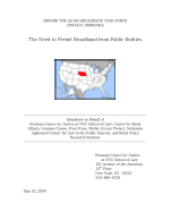Verizon Actions Show Carriers Will Not Wire Rural America
In a recent post the NY Times Bits Blog, Saul Hansell reports "Verizon Boss Hangs Up on Landline Phone Business" - something we have long known. Nonetheless, this makes it even more official: private companies have no interest in bringing true broadband to everyone in the United States.
Verizon is happy to invest in next-generation networks in wealthy suburbs and large metro regions but people in rural areas - who have long dealt with decaying telephone infrastructure - will be lucky to get slow DSL speeds that leave them unable to participate in the digital age. These people will be spun off to other companies so Verizon can focus on the most profitable areas.
For instance, Verizon found it profitable to spin off its customers in Hawaii to another company that quickly ran into trouble before unloading most of its New England customer on FairPoint, moves that enhanced Verizon's bottom line while harming many communities (see the bottom of this post and other posts about FairPoint).
Isen has been writing about it recently - picking up on FairPoint immediately breaking its promises to expand broadband access in the newly acquired territories. No surprise there.
Isen also delved deeper into Verizon's actions, with "Verizon throws 18 states under the progress train." He is right to push this as a national story - the national media focused intently on the absence of major carriers in the broadband stimulus package but they seem utterly uninterested in major carriers running away from broadband investments in rural areas.
Though Frontier likes to position itself as a company focused on bringing broadband to rural areas, it offers slow DSL broadband and poor customer service to people who have no other choices - more of a parasite than angel. As long as we view broadband as a vehicle for moving profits from communities to absentee-owned corporations rather than the infrastructure it truly is, we will farther and farther behind our international peers in the modern economy.



